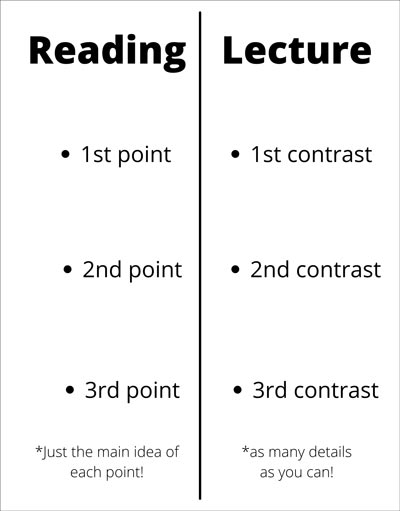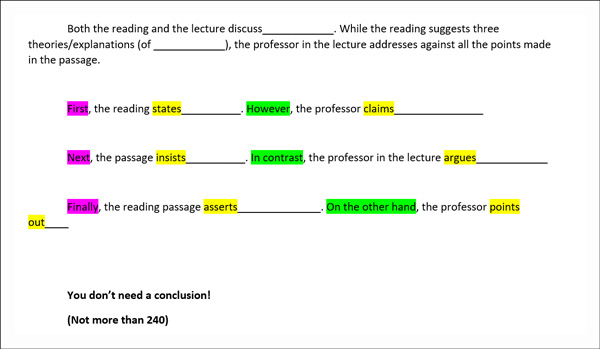TOEFL iBT Test – Tips for the Writing Section

By Pietro Rossini
If you intend to study in the U.S., you will soon find yourself involved with the preparation for the TOEFL iBT test. Most universities and colleges will ask you for a TOEFL score. Every institution has different requirements. To apply for some, you will need a score of 80 while for others 90 or 100 out of 120. Some colleges, furthermore, may ask you for a specific minimum partial score in one of the four sections of the test (Reading, Listening, Speaking, and Writing). In the previous guides, I told about “how to beat the reading section,” “some tips for the listening part,” and “tips for the speaking section.” Here, I will give you some tips for the writing section.
The Writing in the TOEFL iBT test
The writing task is the last one you will find in the TOEFL iBT test. It consists of two parts: first, one integrated task, and second, one independent essay. Let’s take a closer look at both of them.
The Integrated
In the first written task, you will read a short passage and then listen to a lecture about the passage. Therefore, your task is to summarize how the professor in the lecture contrasts all the points made in the passage (note: the professor will never agree with the passage!).
How to take notes
The strategy for this task is pretty easy: you will have 3 minutes to read the passage. However, you don’t need to read everything. You need just to read the last line of the first paragraph (the thesis) and the first line of the next paragraphs (topic sentences). This will take you about 50-60 seconds. Then, on your scratch paper draw a line in the middle. On one side you will write down the 3 topic sentences that you found in the passage, and on the other side the points made in the lecture that contrast each topic sentence. This is all you need to write your integrated essay (see the figure). In fact, when you will listen to the lecture you will look for what contrasts each point made in the passage. Take as many notes as you can from the listening part. This is the most important part of this task. Indeed, if you write down too much information about the reading passage, your score will be downgraded.

This is what your scratch paper will look like!
A good template for the integrated essay

This template is structured to be easy to remember, and it has all the parameters to get a great score in the writing section (I got 28/30 using it!). In fact, TOEFL graders are looking for a variety of words (the yellow ones are all synonyms); connectors (the purple and green ones); and that your content matches with what you found in the reading passage and the lecture. You just need to add the information from the passage (briefly) and the ones from the lecture (extensively and detailed). But remember, for this task you shouldn’t write more than 240 words (and not less than 150). It’s very important not to write a conclusion for this task because the grader will give you a low score if you do so. In fact, in a conclusion usually you would rewrite what you already stated in the previous paragraphs using different words. In this task, this is considered as a redundancy. Therefore, DO NOT WRITE A CONCLUSION!
The Independent
The independent essay is very different from the integrated task. While in the integrated you mustn’t express your opinion at all, in the independent you must express your ideas about a general topic. It looks like the independent task in the speaking section. You will find a question like this: “Do you agree or disagree with the following statement?” Therefore, here your task is to write down a fully detailed explanation of why you agree or disagree with the statement made in the question.
It is very important to practice your creativity at home before the test. In fact, TOEFL graders are not looking for the truth of what you say, but they are interested in how you write in English instead. Consequently, for this task, you should invent real-life examples to support your opinion.
I suggest you to structure your essay like this:
Paragraph #1 Introduction and thesis statement: What’s the topic, and if you agree or disagree; at least two reasons why you agree or disagree with the statement.
Paragraph #2 First reason and two examples that support the first reason.
Paragraph #3 Second reason and two examples that support the second reason.
Paragraph #4 Possible third reason or Conclusion.
For the independent essay the conclusion is extremely important. This is because you are expressing your opinion, and it is important to restate your opinion in the conclusion using synonyms. For this task, you should write at least 300 words. But here, the more you write the better you will be graded.
Free websites where you can practice for the TOEFL iBT test
These strategies and tips are not magic or superstition. They need practice to be effective. It is like when you are learning how to play an instrument. You need to spend time on it applying the correct exercises. The same is with the TOEFL iBT test. The more you practice (with the correct strategies), the better and faster you will become answering the questions.
Here there are some websites that you can use for free for your test practice:
Toeflbank.com – a Korean website where you can practice the 4 sections. I like this tool because it is the only one that gives you feedback also for the speaking and the writing part. Moreover, with your free account, you will get advice on how to get your score goal.
Weixue100.com – a Chinese website that contains tons of free tests. It’s nice for practicing all sections, but particularly the reading part because you can choose one passage at a time.
Zabanexam – an Iranian website that contains full free practice for the four sections. There is only one limit: outside Iran, you need a VPN to use it.
This was the last guide for the TOEFL test. If you missed the previous ones about the other sections, take a look to these links for tips and strategies for each section:
For the Reading section – click or tap here!
For the Listening section – click or tap here!
For the Speaking section – click or tap here!
Pietro Rossini is a Xaverian Missionary and ESL student at Framingham State University. He came to the U.S. in January 2020 with the purpose of studying for a master of arts in journalism at Boston University. His dream is to collect and share stories of humanity around the globe, making the world a single family.
Pietro Rossini
Get matched to the best program for you
Let us know what you're looking for so we can find the best school for you.
Useful Articles
Check Out These Schools


Santa Rosa Junior College
$10,000 — $15,000 Year

Start your U.S. adventure with Study in the USA

Learn About U.S. education financing, housing, and more
Resources
Learn about American culture and education direct from our experts at Study in the USA. Read more













